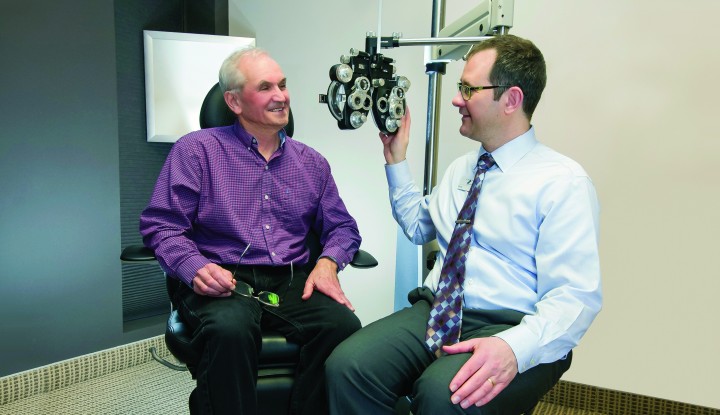Cover photography by: Mark Requena Photography
www.markrequenaphotography.ca
WHO’S FEATURED
Dr. David A. Oliphant
Founder of the Complete Eye and Vision Care Centre
412 Grand Ave E, Chatham, Ontario. 519.354.5870,
www.chatham-eye-doctor.com
Born and raised in Chatham-Kent, Dr. Oliphant is a graduate of the renowned University of Waterloo School of Optometry, and has published three papers on the subject of colour vision. Dr. Oliphant is also an authorized “Night Vision Tester” for police service applications.
Also featured, Angelo Ligori, a senior advisor at Greenfield Global. Angelo has lived in Pain Court since 2010 with his wife, Rosella, and their son, Daniel. On Saturday mornings, you will find Angelo instructing spin class at the YMCA. When you meet Angelo you can see that keeping fit, being active, and taking care of his health is a priority in his life.
AMD AWARENESS
Question & Answer session with Dr. David Oliphant about AMD.
What is AMD?
Macular degeneration is damage to the special area of the retina (the macula) that provides us detailed central vision.
1. What are the early signs of AMD?
In the early stages, most people do not notice changes to their vision. The most common symptom is blurred central vision and difficulty adjusting to changes in light levels (most often it is recovering from bright lights). As the disease progresses, people will have trouble with small detail, like reading and recognizing faces. They become less confident with driving, especially at night. Moderate visual loss may include wavy, distorted, or missing areas of their vision.
2. Who is at risk of developing AMD?
Age: Macular degeneration is the leading cause of blindness in people over the age of 55.
Family history and Race: Individuals with a family history of AMD are at a greater risk. Genetic testing has advanced our understanding of who is at the greatest risk. The Caucasian race is more susceptible to macular degeneration.
Smoking: People who smoke are up to 5X more likely to develop macular degeneration.
Diet and General Health: Macular degeneration is also associated with conditions such as high blood pressure, arteriosclerosis, and obesity. Individuals with diets high in fat, cholesterol, and sugar, and low in antioxidants are more likely to be affected by age-related macular degeneration.
Eye Colour: Light eye colour has also been linked to an increased risk of developing AMD. Lighter colored eyes have less pigment in them and it is believed that lighter colored eyes do not offer as much protection to UV energy as does a darker eye colour. Individuals with high levels UV exposure seem to be at greater risk.
3. What can I do to help prevent AMD?
Work on the behaviours you can control. Maintain your ideal weight with proper diet and exercise, stop smoking if you smoke, and use a hat and/or UV protecting sunglasses when outside.
4. What is the difference between dry & wet AMD?
Dry AMD is the more common form. Vision generally changes slowly over time. Ninety percent of macular degeneration is the dry form. Approximately ten percent of individuals with dry macular degeneration will convert to wet macular degeneration. The wet form usually involves a sudden leakage, or bleeding, from newly formed weak blood vessels under the macula. Symptoms of wet AMD progress rapidly. Any sudden change in vision should be assessed by your optometrist as soon as possible.
5. What do you do if you have AMD?
Evaluate lifestyle factors and improve diet and exercise, if necessary. Be diligent with UV protection. Magnification and proper lighting play a vital role in vision with macular degeneration. Simple changes are using large print books, or increase font size with screen time and use additional light. Tinted lenses will help with glare or issues with light levels. Low vision devices will work in conjunction with glasses to help manage reduced vision.
“See your optometrist regularly to monitor for progression and consider investing in imaging and genetic testing to understand your risk for vision loss.”
This Q & A was provided by: Dr. David Oliphant Optometrist
412 Grand Ave E, Chatham, Ontario.
519.354.5870 | chatham-eye-doctor.com



